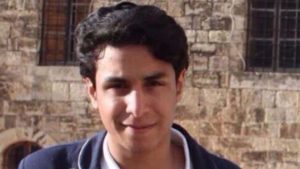AMNESTY INTERNATIONAL
Press Release 27 April 2011 AI Index: PRE01/227/2011
Sharp rise in public executions as Iran executes first juvenile offenders in 2011
Amnesty International has condemned a sharp rise in the rate of executions in public in Iran – which have included the first executions of juvenile offenders in the world this year.
Since the start of 2011, up to 13 men have been hanged in public, compared to 14 such executions recorded by Amnesty International from official Iranian sources in the whole of 2010. Eight of those executions have taken place since 16 April 2011.
On 20 April 2011, two juvenile offenders – identified only as “A.N” and “H.B” – were among three individuals hanged in public in Bandar Abbas, southern Iran, after being convicted over a rape and murder committed when they were only 17. A fourth man was hanged at the same time for rape.
“Yet again, Iran has distinguished itself by being the only country this year to execute juvenile offenders. No more juvenile offenders must die at the hands of the state,” said Hassiba Hadj Sahraoui, Deputy Director of Amnesty International’s Middle East and North Africa Programme
“Not only were these young men executed for crimes committed when aged under 18, but their executions were carried out in public. Public executions are not only a violation of the right to life, but are a gross affront to human dignity which cannot be tolerated.”
On 16 April 2011, three men were also hanged in public in Shiraz for murder, armed robbery and kidnapping. A fourth man was hanged on the same day near Kazeroun in Fars Province after being convicted of four counts of murder.
Public executions in Iran are usually carried out by cranes which lift the condemned person by a noose around the neck. They are advertised in advance.
Iran is one of the only countries that still imposes the death penalty on juvenile offenders – those convicted of an alleged crime committed before they were 18 – and was the only country known to have executed a juvenile offender in 2010. Executions of juvenile offenders are strictly prohibited under international law.
UN human rights experts have made it clear that executions in public serve no legitimate interest and only increase the cruel, inhuman and degrading nature of this punishment.
“It is deeply disturbing that despite a moratorium on public executions ordered in 2008, the Iranian authorities are once again seeking to intimidate people by such spectacles which not only dehumanize the victim, but brutalize those who witness it,” said Hassiba Hadj Sahraoui.
There was a sharp rise in the rate of executions in Iran in December 2010 and January 2011, with at least 86 people executed in January alone.
The rate fell significantly in February 2011, after international condemnation of the rise, but has risen again since the end of the Iranian New Year holiday in early April.
According to official sources, at least 135 people – ten in public – have been executed so far this year. Credible reports suggest over 40 others – three of which were said to have taken place in public in Salmas, north-west Iran, in February – have also taken place, which have not been acknowledged by the authorities.
UN human rights bodies have also stressed the need for states which carry out executions to be transparent about their use of the death penalty. The UN General Assembly has passed three resolutions calling for a worldwide moratorium on executions.



